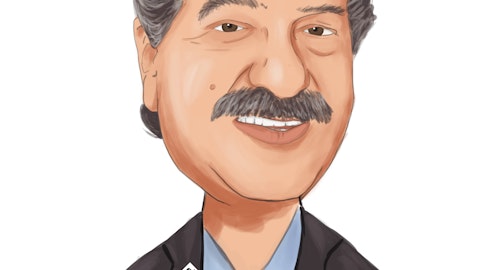Arthur Suazo : And the ground’s following really, Michael, in Seattle, as Victor mentioned, with return to office, really starting to take hold more and more with the mandates. It’s really the growth of tech users coming back into the market that we’ve seen really grow over the last 3 quarters, right? Also, it’s not lost that San Francisco, obviously, has shown the most growth in demand, really the 80% growth in demand year-over-year and probably 25% quarter-over-quarter because of that same reason, because of tech. In Los Angeles, we’re really only talking about relative to our portfolio, West Los Angeles and the reasons Victor stated with regards to the strike. Entertainment and media, were really driving and have been driving that market through the pandemic and keeping it healthy. And we’ll start to see those numbers come back, but it’s still very, very modest level of activity.
Michael Griffin : Great. That’s helpful. And then maybe one question on occupancy, if I can. I think Mark, in his prepared remarks, kind of alluded to a stabilized expectation for occupancy, heading into 2024. Should we read that as kind of flat from current levels there? Anything you can provide there would be helpful.
Mark Lammas : Our forecast shows steady improvement, actually, into — as we head into ’24 and even into ’25. I mean we also mentioned the sort of the shift, if you will, from the expirations that we’ve experienced over the past year to what will be 1.5 years of very little large expirations, only 1 over 100,000 feet. That matches really, really well with the pipeline in terms of where the demand is coming from. So yes, we expect to see steady improvement essentially from here on out and for the foreseeable future.
Operator: Our next question comes from Caitlin Burrows of Goldman Sachs.
Caitlin Burrows : So we’ve had the writers’ strike and actors strike. I’m wondering if you have a view on whether [cruise] will strike, if that’s anything you’ve heard about.
Victor Coleman : [Cruise], next year. Next year, yes. No, I mean we haven’t heard anything about that at this stage. I mean, they typically have been more in line. And you never know what happens, Caitlin, right? But they typically move more in line with like the Directors Guild and they settle — [resettled] like prior, too. I would — as I said, we’re in a unique timeline, with multiple industries looking to strike to. The two biggest are obviously SAG-AFTRA and WGA, and they’ve always led the way. So we’re hopeful that won’t happen. But so far today, we’ve heard nothing.
Caitlin Burrows : Okay. And then also, Harout actually marked last quarter, you mentioned that you guys had stress tested your covenants through the end of ’24 and that you would remain, even in the worst quarter, over 300 basis points clear of the limit. So now you just have 230 basis points remaining buffer on the unsecured indebtedness to unencumbered asset value covenant. So wondering if you could go through why it might have exceeded that stress test that you mentioned last quarter and kind of your confidence in the trend, going forward, and ability to forecast that?
Harout Diramerian : Yes. I mean we are still largely in line with what our own expectations, although it is — there are — it’s a fairly complicated calculation, it uses trailing numbers that get gross stop. There’s one-time items that have to get excluded and — so we are materially in line, I would say. I do appreciate your point regarding the sort of 300 basis points. As we look at the number and we’ve stress test it, we still are confident we’re going to remain compliant. So I’m not sure there’s much more we can add other than we’re focused on it, we’re looking at all of our leasing expectations, we factored in the sales that Victor mentioned earlier, they’re running through all of our projections, and we expect to remain compliant.
Operator: Our next question comes from Blaine Heck at Wells Fargo.
Blaine Heck : So just following up on covenants and thinking about some of your options to bring your metric away from the limit, I understand increasing income would certainly help on some of them. But just taking the income side out of the equation, I guess, what can you do on the balance sheet side? I believe if you kind of draw down the rest of your line, that puts you in violation. But if you could confirm that, it’d be helpful. Have you looked into any additional secured debt on the media portfolio, is that a possibility? Or does it just really come down to dispositions at this point?
Mark Lammas : There’s more than — I mean dispositions can — are a good contributor, and we expect the dispositions that we’ve mentioned already to be accretive to the unsecured metrics on…
Victor Coleman : We also have other assets in the portfolio that we’ve mentioned, Blaine, in the past that are not part of the facility or credit [feasibility] that we are looking at options around that, which enhances a fair amount of liquidity as well.
Mark Lammas : Yes. Yes. And just maybe just [reify] that point, there are other levers, Blaine, beyond just disposition. So there’s unencumbered assets that we could put — I mean there’s — sorry, there’s assets that we could put debt on that don’t run through the unencumbered metrics, that we could put — that would be accretive. There are other assets we own that are not real estate assets, they are notes. Those are — we have the ability to sell those. Those would be accretive to the metrics. So there are a number of — on levers, if you will, that we can pull beyond asset sales that are all — would improve those metrics.
Blaine Heck : Okay. That’s helpful. We noticed the term on leases signed during the quarter was significantly shorter than normal, I think, right around 3 years. Can you just talk about that, whether there was anything specific that might have skewed that downward? And whether those shorter terms are prevalent in kind of the leases you have in the pipeline as well?
Arthur Suazo : Blaine, it’s Arthur. No, they’re not prevalent. Listen, the sequential decrease was primarily due to 2 — really 2 transactions. The first was a 6-month, 35,000 square foot on office use transaction in Pioneer Square, which we did as an accommodation to try to keep the tenant long term. And the second was a 24-month extension on the 140,000 square foot expiration in Denny Triangle, again, with the intent to further extend the lease downstream. With the combined effect of these 2 deals, our weighted average lease term was right in line with the prior 2 quarters average — weighted average lease term of about 45.5 months. So yes, there was a couple of outliers, and that was the explanation.
Blaine Heck : All right. And then last one, given that you launched the tenant at Sunset Las Palmas, is that now the focus on the leasing side within your studio segment? And how does that affect your ability to lease up Glenoaks? I guess, are they kind of competitive properties at this point kind of going for the same tenants or separate?
Victor Coleman : So Blaine, I mean, listen, we lost a tenant that’s been there because they stopped production. And they had a right to get out. And so that show was canceled based on the strike. That’s the first time we’ve ever had a vacancy in the history of ownership of that asset, and quite frankly, in Glenoak, in Gower and Bronson it is the same. It’s not competitive to Glenoaks. I mean the activity on Glenoaks has been very surprisingly high. And the interest is — it’s the first of its kind of a purpose-built facility, and the interest is very high. As I mentioned in my prepared remarks, I mean, we’re already seeing writers, rooms and activity around that up and running. When the actor strike is over, purpose-built facilities will have the highest demand.
And I think we’re very comfortable that this is not a trend, this is a moment in time. My guess is the parent company that left us will be the first company that’s going to call us and want to put a show in there, going forward. And we’ll have options at Las Palmas, just like we have options at Glenoaks and all of our Quixote facilities.
Operator: Our next question is from Rich Anderson at Wedbush.



